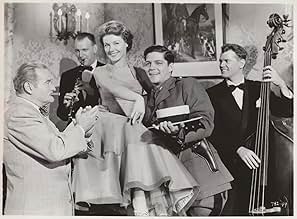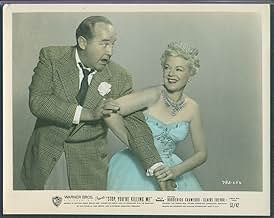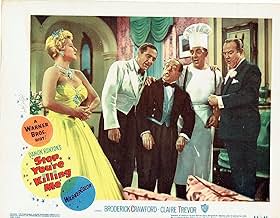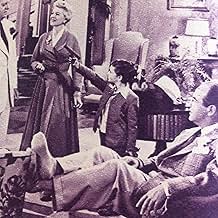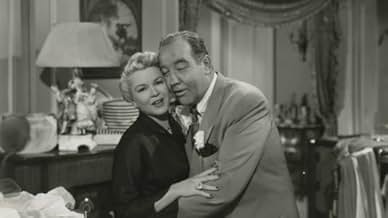IMDb RATING
6.1/10
360
YOUR RATING
After the repeal of Prohibition, a beer-maker decides to sell beer legally, but no one wants to buy his revolting beer, and he does not want to force sales.After the repeal of Prohibition, a beer-maker decides to sell beer legally, but no one wants to buy his revolting beer, and he does not want to force sales.After the repeal of Prohibition, a beer-maker decides to sell beer legally, but no one wants to buy his revolting beer, and he does not want to force sales.
- Director
- Writers
- Stars
Harry Morgan
- Innocence
- (as Henry Morgan)
Eddie Acuff
- Cab Driver
- (uncredited)
Bill Alcorn
- Party Guest
- (uncredited)
Phil Arnold
- Little Dutch
- (uncredited)
Larry J. Blake
- Police Captain
- (uncredited)
- Director
- Writers
- All cast & crew
- Production, box office & more at IMDbPro
Featured reviews
What a fun movie! Kind of a precursor of "Some Like it Hot" the movie has a lot of fun with the Runyonesque characters (Runyon wrote the screenplay) and the goofy goings on of a Prohibition beer baron who decides to go legit when Prohibition is repealed. Broderick Crawford is wonderful as the blustering but soft-hearted Remy Marko. The film also has a few nicely placed and very enjoyable musical numbers, and who knew Broderick Crawford could sing so pleasantly (turns out his parents were both opera singers!). The farce is generous and hilarious, with dead bodies cropping up everywhere, and Margaret Dumont putting in a turn as the usual easily offended matron. Joseph Vitale, Sheldon Leonard and Charles Cantor do a great job as Marko's lovable hood sidekicks. Harry Morgan appears but his contribution is limited mostly to climbing over transoms and in and out of windows. The production values are wonderful. All in all a surprisingly wonderful treat.
Prohibition beer baron Broderick Crawford goes legit with repeal. He doesn't change his production methods, so he also goes broke. He needs half a million dollars or he loses everything. Fortunately, one of the mugs at a party he is throwing in Saratoga to celebrate the engagement of daughter Virginia Gibson has left a satchel containing that amount from a racetrack robbery.
It's from a play co-written by Damon Runyon. Warners had made it in 1938 with Edward G. Robinson in the lead role, and now was the time to offer the world a Technicolor version. Crawford plays it as big and blustery except around wife Claire Trevor. However, while everyone puts in good effort, it's another story whose time has passed. Still, fun to see the Runyonesque characters at play, particularly Sheldon Leonard. With Harry Morgan, Margaret Dumont, and Jack Pepper.
It's from a play co-written by Damon Runyon. Warners had made it in 1938 with Edward G. Robinson in the lead role, and now was the time to offer the world a Technicolor version. Crawford plays it as big and blustery except around wife Claire Trevor. However, while everyone puts in good effort, it's another story whose time has passed. Still, fun to see the Runyonesque characters at play, particularly Sheldon Leonard. With Harry Morgan, Margaret Dumont, and Jack Pepper.
Warner Brothers waited just 14 years to remake its hit 1938 film, "A Slight Case of Murder." And, it's doubtful that it paid off to remake it at all. This retitled film - also based on a Damon Runyan 1935 play, had box office receipts of $2.5 million. It didn't even match the $2.9 million in box office of the 1938 film. That was with considerably higher ticket prices and more population to draw from. And, I think it's ridiculous to call a film a musical just because a couple of people sing along with a song on a record player.
To be fair, this is a good film. If the first film had not been made, this one would no doubt have done much better. But whenever a movie is remade, especially in less than 20 years between films, the comparison by critics and early viewers is a certainty. And, by no stretch can this film come close to the original. Broderick Crawford gives a very good performance here. But he would have to have given the greatest performance of all films for the past 10 years - or something like that, to have equaled Edward G. Robinson as Remy Marco. Oh, yeah, in this film the family name is spelled Marko.
Only one of the roles in this remake is up to its original role in the first film. That's Claire Trevor as Nora, Remy's wife. She's as good or better than Ruth Donnelly. Trevor gives a different touch to the role and she shines in it. As to the rest, the Brothers Warner couldn't come close to the original roles. Alan Jenkins as Mike was not to be outdone by Charles Cantor. Sheldon Leonard is good in these roles, and his Lefty is just about as good as Edward Brophy in the first film. Harry Morgan is a draw with Joe Downing as Innocence. But all the rest of this cast have considerably lesser roles or performances.
Anyone who hasn't seen the first film may enjoy this one. But, for those who have seen the original, its best to pass on this one.
To be fair, this is a good film. If the first film had not been made, this one would no doubt have done much better. But whenever a movie is remade, especially in less than 20 years between films, the comparison by critics and early viewers is a certainty. And, by no stretch can this film come close to the original. Broderick Crawford gives a very good performance here. But he would have to have given the greatest performance of all films for the past 10 years - or something like that, to have equaled Edward G. Robinson as Remy Marco. Oh, yeah, in this film the family name is spelled Marko.
Only one of the roles in this remake is up to its original role in the first film. That's Claire Trevor as Nora, Remy's wife. She's as good or better than Ruth Donnelly. Trevor gives a different touch to the role and she shines in it. As to the rest, the Brothers Warner couldn't come close to the original roles. Alan Jenkins as Mike was not to be outdone by Charles Cantor. Sheldon Leonard is good in these roles, and his Lefty is just about as good as Edward Brophy in the first film. Harry Morgan is a draw with Joe Downing as Innocence. But all the rest of this cast have considerably lesser roles or performances.
Anyone who hasn't seen the first film may enjoy this one. But, for those who have seen the original, its best to pass on this one.
This is a remake of "A Slight Case of Murder," and suffice it to say that Broderick Crawford is no Edward G. Robinson! The remake, with Crawford as the reformed bootlegger who won't even drink the horrid beer he makes, is funny enough, but be sure to see it first, then the 1938 original. The decline may have something to do with the 50's sensibility's being too far removed from both Prohibition and 1930's screwball comedy.
In this remake of A Slight Case Of Murder, Broderick Crawford steps into the shoes of Edward G. Robinson in a remake of the film that had its origins as a Broadway play written by Damon Runyon. It was a flop play on Broadway in the Thirties but a roaring success as a film.
Both Crawford and Robinson in the leads of their respective films got a chance to burlesque the tough guy images both so carefully cultivated. Both looked like they were enjoying themselves on screen.
The film concerns the end of Prohibition and a gangster who made it big in the illegal beer racket now wants to go legitimate and gain some respectability. Crawford and his wife Claire Trevor rent a big country mansion near the Saratoga racetrack and throw a huge party. They want respectability not just for themselves but for daughter Virginia Gibson who is engaged into some upper crust WASP family.
But a robbery of bookies at Saratoga (remember this is set in the 30s before pari-mutual machines so the tracks had bookies to take bets) and the crooks using this 'abandoned' mansion as a hideout interrupt all those plans. Without revealing more all the legal and domestic and financial problems all get nicely resolved as the film concludes in a very funny way.
Other than some really unnecessary musical numbers the film is practically a carbon copy of the original. Stop, You're Killing Me is highly recommended as tonic for the funny bone.
Both Crawford and Robinson in the leads of their respective films got a chance to burlesque the tough guy images both so carefully cultivated. Both looked like they were enjoying themselves on screen.
The film concerns the end of Prohibition and a gangster who made it big in the illegal beer racket now wants to go legitimate and gain some respectability. Crawford and his wife Claire Trevor rent a big country mansion near the Saratoga racetrack and throw a huge party. They want respectability not just for themselves but for daughter Virginia Gibson who is engaged into some upper crust WASP family.
But a robbery of bookies at Saratoga (remember this is set in the 30s before pari-mutual machines so the tracks had bookies to take bets) and the crooks using this 'abandoned' mansion as a hideout interrupt all those plans. Without revealing more all the legal and domestic and financial problems all get nicely resolved as the film concludes in a very funny way.
Other than some really unnecessary musical numbers the film is practically a carbon copy of the original. Stop, You're Killing Me is highly recommended as tonic for the funny bone.
Did you know
- TriviaThe film was originally designed as a vehicle for Danny Kaye, then under contract to Warner Brothers, but the comedian terminated his agreement with the studio.
- GoofsRepeal of Prohibition was December 5, 1933, but in the opening scene set that day in Manhattan, most people are wearing warm-weather clothing. In addition, on the marquee of the Loew's State Theatre is the title of the film Crépuscule (1941) and on the marquee of the Criterion Theatre is Manhattan Merry-Go-Round (1937).
- ConnectionsReferences Manhattan Merry-Go-Round (1937)
- SoundtracksStop, You're Killing Me
(uncredited)
Music by Carl Sigman
Lyrics by Bob Hilliard
Sung by an off-screen chorus during the opening credits
Details
- Runtime
- 1h 26m(86 min)
- Aspect ratio
- 1.37 : 1
Contribute to this page
Suggest an edit or add missing content

